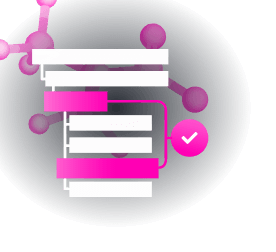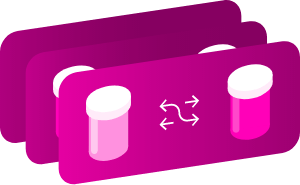Explore a selection of our essential drug information below, or:
Identification
- Summary
Human C1-esterase inhibitor is a C1 inhibitor used to prevent angioedema attacks associated with hereditary angioedema.
- Brand Names
- Berinert, Cinryze, Haegarda
- Generic Name
- Human C1-esterase inhibitor
- DrugBank Accession Number
- DB06404
- Background
C1 Esterase Inhibitor (Human) is composed of purified endogenous complement component-1 esterase inhibitor (hC1INH) isolated from human plasma. The primary function of endogenous C1INH is to regulate the activation of the complement and contact system pathways.3,5
This drug is indicated for prophylaxis and treatment of Hereditary Angioedema (HAE), a human genetic disorder caused by a shortage of C1 inhibitor activity that results in an overreaction of the immune system. The disease is characterized by acute attacks of painful, and in some cases, fatal swelling of several soft tissues or edema, which may last up to five days when untreated.3,5
- Type
- Biotech
- Groups
- Approved
- Biologic Classification
- Protein Based Therapies
Other protein based therapies - Protein Structure

- Protein Chemical Formula
- Not Available
- Protein Average Weight
- 68000.0 Da
- Sequences
- Not Available
- Synonyms
- C1 Esterase Inhibitor (Human)
- C1 inhibitor
- C1 inhibitor (human)
- C1 inhibitor human
- C1-esterase inhibitor, human
- C1-INH
- C1-inhibiting factor
- C1-inhibitor, plasma derived
- Human C1 inhibitor
- Human C1-esterase inhibitor
- Plasma protease C1 inhibitor
- External IDs
- RVG-19303
Pharmacology
- Indication
Intravenous and subcutaneous formulations of the human C1-esterase inhibitor are indicated for routine prophylaxis against acute attacks of hereditary angioedema in patients six years of age and older.3,5 It is also used to treat these in adult and adolescent patients with hereditary angioedema.6
 Reduce drug development failure ratesBuild, train, & validate machine-learning modelswith evidence-based and structured datasets.Build, train, & validate predictive machine-learning models with structured datasets.
Reduce drug development failure ratesBuild, train, & validate machine-learning modelswith evidence-based and structured datasets.Build, train, & validate predictive machine-learning models with structured datasets.- Associated Conditions
Indication Type Indication Combined Product Details Approval Level Age Group Patient Characteristics Dose Form Prophylaxis of Acute attack of hereditary angioedema •••••••••••• ••••••••••• •••••• ••••••••• Treatment of Acute attack of hereditary angioedema of the abdomen •••••••••••• ••••••••••• •••••• ••••••••• Treatment of Acute attack of hereditary angioedema of the larynx •••••••••••• ••••••••••• •••••• ••••••••• Treatment of Acute attack of hereditary angioedema of the face •••••••••••• ••••••••••• •••••• ••••••••• - Contraindications & Blackbox Warnings
 Prevent Adverse Drug Events TodayTap into our Clinical API for life-saving information on contraindications & blackbox warnings, population restrictions, harmful risks, & more.Avoid life-threatening adverse drug events with our Clinical API
Prevent Adverse Drug Events TodayTap into our Clinical API for life-saving information on contraindications & blackbox warnings, population restrictions, harmful risks, & more.Avoid life-threatening adverse drug events with our Clinical API- Pharmacodynamics
The C1 esterase inhibitor treats and prevents attacks of hereditary angioedema. It has a long duration of action as it is given every 3-4 days prophylactically.3 Patients should be counselled regarding the risk of hypersensitivity reactions as well as arterial and venous thromboemboli.3
- Mechanism of action
The C1 esterase inhibitor binds to proteins such as C1s, kallikrein, factor XIIa, and XIa and irreversibly inactivates them. Patients with hereditary angioedema have low levels of C1 esterase inhibitors. By providing patients with C1 esterase inhibitors, this may prevent contact system activation, which prevents increases in vascular permeability. Manifestations of hereditary angioedema may be prevented by preventing increases in vascular permeability.3
Target Actions Organism AComplement C1r subcomponent inhibitorHumans AComplement C1s subcomponent inhibitorHumans APlasma kallikrein inhibitorHumans ACoagulation factor XII inhibitorHumans ACoagulation factor XI inhibitorHumans ATissue-type plasminogen activator inhibitorHumans UProthrombin inhibitorHumans - Absorption
Following intravenous administration of a single dose, the Cmax was 0.68 ± 0.08 U/mL and Tmax was 3.9 ± 7.3 hours.3
- Volume of distribution
Not Available
- Protein binding
Data regarding the protein binding of the C1 esterase inhibitor is not readily available.3
- Metabolism
Protein drugs are expected to be degraded by proteases and other catalytic enzymes to smaller peptides and amino acids.1
- Route of elimination
After nonspecific proteolysis, the amino acids from protein drugs are reused for protein synthesis or further broken down and eliminated by the kidneys.1
- Half-life
Following intravenous administration of a single dose, the half-life was 56 ± 36 hours.3 Subcutaneous administration produces a half-life of 199.6 hours.2
- Clearance
Following intravenous administration of a single dose, the clearance rate was 0.85 ± 1.07 mL/min.3
- Adverse Effects
 Improve decision support & research outcomesWith structured adverse effects data, including: blackbox warnings, adverse reactions, warning & precautions, & incidence rates. View sample adverse effects data in our new Data Library!Improve decision support & research outcomes with our structured adverse effects data.
Improve decision support & research outcomesWith structured adverse effects data, including: blackbox warnings, adverse reactions, warning & precautions, & incidence rates. View sample adverse effects data in our new Data Library!Improve decision support & research outcomes with our structured adverse effects data.- Toxicity
Not Available
- Pathways
- Not Available
- Pharmacogenomic Effects/ADRs
- Not Available
Interactions
- Drug Interactions
- This information should not be interpreted without the help of a healthcare provider. If you believe you are experiencing an interaction, contact a healthcare provider immediately. The absence of an interaction does not necessarily mean no interactions exist.
Drug Interaction Integrate drug-drug
interactions in your softwareCyproterone acetate The risk or severity of thromboembolism can be increased when Cyproterone acetate is combined with Human C1-esterase inhibitor. Desogestrel The risk or severity of thromboembolism can be increased when Desogestrel is combined with Human C1-esterase inhibitor. Dienogest The risk or severity of thromboembolism can be increased when Dienogest is combined with Human C1-esterase inhibitor. Drospirenone The risk or severity of thromboembolism can be increased when Drospirenone is combined with Human C1-esterase inhibitor. Dydrogesterone The risk or severity of thromboembolism can be increased when Dydrogesterone is combined with Human C1-esterase inhibitor. - Food Interactions
- No interactions found.
Products
 Drug product information from 10+ global regionsOur datasets provide approved product information including:dosage, form, labeller, route of administration, and marketing period.Access drug product information from over 10 global regions.
Drug product information from 10+ global regionsOur datasets provide approved product information including:dosage, form, labeller, route of administration, and marketing period.Access drug product information from over 10 global regions.- Brand Name Prescription Products
Name Dosage Strength Route Labeller Marketing Start Marketing End Region Image Berinert Injection, powder, lyophilized, for solution; Kit 500 [iU]/10mL Intravenous CSL Behring GmbH 2011-12-22 Not applicable US Berinert 1500 Kit; Powder, for solution 1500 unit / vial Intravenous Csl Behring 2015-05-06 Not applicable Canada Berinert 500 Kit; Powder, for solution 500 unit / vial Intravenous Csl Behring 2010-10-06 Not applicable Canada Cinryze Injection, powder, for solution 500 U Intravenous Takeda Manufacturing Austria Ag 2016-09-08 Not applicable EU Cinryze Injection, powder, lyophilized, for solution; Kit 500 [iU]/5mL Intravenous Takeda Pharmaceuticals America, Inc. 2021-01-15 Not applicable US
Categories
- ATC Codes
- B06AC01 — C1-inhibitor, plasma derived
- Drug Categories
- Amino Acids, Peptides, and Proteins
- Blood and Blood Forming Organs
- Blood Proteins
- C1 inhibitors
- Carbohydrates
- Complement C1 Inactivator Proteins
- Complement Inactivating Agents
- Complement Inactivator Proteins
- Complement System Proteins
- Decreased Vascular Permeability
- Drugs Used in Hereditary Angioedema
- Enzyme Inhibitors
- Glycoconjugates
- Glycoproteins
- Immunologic Factors
- Immunoproteins
- Kallikrein Inhibitors
- Peptides
- Protease Inhibitors
- Proteins
- Serine Protease Inhibitors
- Serpins
- Chemical TaxonomyProvided by Classyfire
- Description
- Not Available
- Kingdom
- Organic Compounds
- Super Class
- Organic Acids
- Class
- Carboxylic Acids and Derivatives
- Sub Class
- Amino Acids, Peptides, and Analogues
- Direct Parent
- Peptides
- Alternative Parents
- Not Available
- Substituents
- Not Available
- Molecular Framework
- Not Available
- External Descriptors
- Not Available
- Affected organisms
- Humans and other mammals
Chemical Identifiers
- UNII
- 6KIC4BB60G
- CAS number
- Not Available
References
- General References
- Katsila T, Siskos AP, Tamvakopoulos C: Peptide and protein drugs: the study of their metabolism and catabolism by mass spectrometry. Mass Spectrom Rev. 2012 Jan-Feb;31(1):110-33. doi: 10.1002/mas.20340. Epub 2011 Jun 22. [Article]
- Martinez-Saguer I, Cicardi M, Suffritti C, Rusicke E, Aygoren-Pursun E, Stoll H, Rossmanith T, Feussner A, Kalina U, Kreuz W: Pharmacokinetics of plasma-derived C1-esterase inhibitor after subcutaneous versus intravenous administration in subjects with mild or moderate hereditary angioedema: the PASSION study. Transfusion. 2014 Jun;54(6):1552-61. doi: 10.1111/trf.12501. Epub 2013 Nov 24. [Article]
- FDA Approved Blood Products: Cinryze C1 Esterase Inhibitor Intravenous Injection [Link]
- FDA: Supplemental Approval of C1 Esterase Inhibitors [Link]
- FDA Approved Blood Products: Haegarda C1 Esterase Inhibitor Subcutaneous Injection [Link]
- FDA Approved Drug Products: BERINERT [C1 Esterase Inhibitor (Human)] Intravenous Injection [Link]
- External Links
- UniProt
- P05155
- PubChem Substance
- 347910350
- 809864
- RxList
- RxList Drug Page
- Drugs.com
- Drugs.com Drug Page
- Wikipedia
- C1-inhibitor
Clinical Trials
- Clinical Trials
Clinical Trial & Rare Diseases Add-on Data Package
Explore 4,000+ rare diseases, orphan drugs & condition pairs, clinical trial why stopped data, & more. Preview package Phase Status Purpose Conditions Count Start Date Why Stopped 100+ additional columns Unlock 175K+ rows when you subscribe.View sample data4 Completed Prevention Hereditary Angioedema (HAE) 1 somestatus stop reason just information to hide 4 Completed Treatment Hereditary Angioedema Type I and II 1 somestatus stop reason just information to hide 4 Terminated Treatment Asthma 1 somestatus stop reason just information to hide 3 Completed Not Available Hereditary Angioedema (HAE) 1 somestatus stop reason just information to hide 3 Completed Prevention Hereditary Angioedema (HAE) 1 somestatus stop reason just information to hide
Pharmacoeconomics
- Manufacturers
- Not Available
- Packagers
- Not Available
- Dosage Forms
Form Route Strength Injection, powder, for solution Intravenous 1500 IU Injection, powder, for solution Intravenous 2000 IU Injection, powder, for solution Intravenous 3000 IU Injection, powder, for solution Intravenous 500 IU Injection, powder, lyophilized, for solution; kit Intravenous 500 [iU]/10mL Kit; powder, for solution Intravenous 1500 unit / vial Kit; powder, for solution Intravenous 500 unit / vial Injection, powder, for solution Intravenous 500 U Injection, powder, lyophilized, for solution Intravenous 500 [iU]/5mL Injection, powder, lyophilized, for solution; kit Intravenous 500 [iU]/5mL Powder, for solution Intravenous 500 unit / vial Injection, solution Intravenous 500 iu/5ml Kit; powder, for solution Subcutaneous 2000 unit / vial Kit; powder, for solution Subcutaneous 3000 unit / vial Injection, powder, for solution; kit Subcutaneous 2000 [iU]/4mL Injection, powder, for solution; kit Subcutaneous 3000 [iU]/6mL - Prices
- Not Available
- Patents
- Not Available
Properties
- State
- Solid
- Experimental Properties
- Not Available
Targets

- Kind
- Protein
- Organism
- Humans
- Pharmacological action
- Yes
- Actions
- Inhibitor
- General Function
- Serine-type peptidase activity
- Specific Function
- C1r B chain is a serine protease that combines with C1q and C1s to form C1, the first component of the classical pathway of the complement system.
- Gene Name
- C1R
- Uniprot ID
- P00736
- Uniprot Name
- Complement C1r subcomponent
- Molecular Weight
- 80118.04 Da
References
- Harpel PC, Cooper NR: Studies on human plasma C1 inactivator-enzyme interactions. I. Mechanisms of interaction with C1s, plasmin, and trypsin. J Clin Invest. 1975 Mar;55(3):593-604. [Article]
- Kind
- Protein
- Organism
- Humans
- Pharmacological action
- Yes
- Actions
- Inhibitor
- General Function
- Serine-type endopeptidase activity
- Specific Function
- C1s B chain is a serine protease that combines with C1q and C1r to form C1, the first component of the classical pathway of the complement system. C1r activates C1s so that it can, in turn, activat...
- Gene Name
- C1S
- Uniprot ID
- P09871
- Uniprot Name
- Complement C1s subcomponent
- Molecular Weight
- 76683.905 Da
References
- Harpel PC, Cooper NR: Studies on human plasma C1 inactivator-enzyme interactions. I. Mechanisms of interaction with C1s, plasmin, and trypsin. J Clin Invest. 1975 Mar;55(3):593-604. [Article]
- Kind
- Protein
- Organism
- Humans
- Pharmacological action
- Yes
- Actions
- Inhibitor
- General Function
- Serine-type endopeptidase activity
- Specific Function
- The enzyme cleaves Lys-Arg and Arg-Ser bonds. It activates, in a reciprocal reaction, factor XII after its binding to a negatively charged surface. It also releases bradykinin from HMW kininogen an...
- Gene Name
- KLKB1
- Uniprot ID
- P03952
- Uniprot Name
- Plasma kallikrein
- Molecular Weight
- 71369.205 Da
References
- van der Graaf F, Koedam JA, Bouma BN: Inactivation of kallikrein in human plasma. J Clin Invest. 1983 Jan;71(1):149-58. [Article]
- Kind
- Protein
- Organism
- Humans
- Pharmacological action
- Yes
- Actions
- Inhibitor
- General Function
- Serine-type endopeptidase activity
- Specific Function
- Factor XII is a serum glycoprotein that participates in the initiation of blood coagulation, fibrinolysis, and the generation of bradykinin and angiotensin. Prekallikrein is cleaved by factor XII t...
- Gene Name
- F12
- Uniprot ID
- P00748
- Uniprot Name
- Coagulation factor XII
- Molecular Weight
- 67791.53 Da
References
- de Agostini A, Lijnen HR, Pixley RA, Colman RW, Schapira M: Inactivation of factor XII active fragment in normal plasma. Predominant role of C-1-inhibitor. J Clin Invest. 1984 Jun;73(6):1542-9. [Article]
- Kind
- Protein
- Organism
- Humans
- Pharmacological action
- Yes
- Actions
- Inhibitor
- General Function
- Serine-type endopeptidase activity
- Specific Function
- Factor XI triggers the middle phase of the intrinsic pathway of blood coagulation by activating factor IX.
- Gene Name
- F11
- Uniprot ID
- P03951
- Uniprot Name
- Coagulation factor XI
- Molecular Weight
- 70108.56 Da
References
- Cicardi M, Zingale L, Zanichelli A, Pappalardo E, Cicardi B: C1 inhibitor: molecular and clinical aspects. Springer Semin Immunopathol. 2005 Nov;27(3):286-98. Epub 2005 Nov 11. [Article]
- Kind
- Protein
- Organism
- Humans
- Pharmacological action
- Yes
- Actions
- Inhibitor
- General Function
- Serine-type endopeptidase activity
- Specific Function
- Converts the abundant, but inactive, zymogen plasminogen to plasmin by hydrolyzing a single Arg-Val bond in plasminogen. By controlling plasmin-mediated proteolysis, it plays an important role in t...
- Gene Name
- PLAT
- Uniprot ID
- P00750
- Uniprot Name
- Tissue-type plasminogen activator
- Molecular Weight
- 62916.495 Da
References
- Cicardi M, Zingale L, Zanichelli A, Pappalardo E, Cicardi B: C1 inhibitor: molecular and clinical aspects. Springer Semin Immunopathol. 2005 Nov;27(3):286-98. Epub 2005 Nov 11. [Article]
- Kind
- Protein
- Organism
- Humans
- Pharmacological action
- Unknown
- Actions
- Inhibitor
- General Function
- Thrombospondin receptor activity
- Specific Function
- Thrombin, which cleaves bonds after Arg and Lys, converts fibrinogen to fibrin and activates factors V, VII, VIII, XIII, and, in complex with thrombomodulin, protein C. Functions in blood homeostas...
- Gene Name
- F2
- Uniprot ID
- P00734
- Uniprot Name
- Prothrombin
- Molecular Weight
- 70036.295 Da
References
- Cugno M, Bos I, Lubbers Y, Hack CE, Agostoni A: In vitro interaction of C1-inhibitor with thrombin. Blood Coagul Fibrinolysis. 2001 Jun;12(4):253-60. [Article]
Drug created at March 19, 2008 16:29 / Updated at June 03, 2022 07:24


